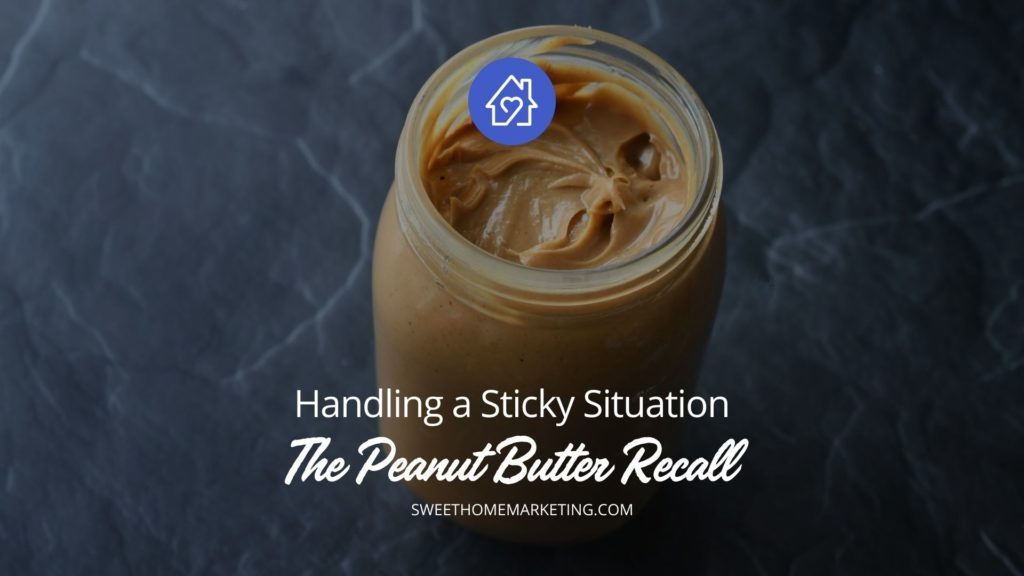
Over the weekend, I received a call from the Weis grocery store and two emails from Instacart. They were both notifying me that I had purchased JIF peanut butter products that were likely recalled due to a salmonella outbreak. When I finally checked all the peanut butter we had in our home, everything had to be thrown in the trash – including one jar of peanut butter that was mostly gone.
This is infuriating. My son (3) and I were both ill last weekend with the same symptoms that are listed as the results of consuming the contaminated peanut butter. I’ve been a JIF consumer for decades; rationalizing the higher price by saying it’s higher quality. I trusted the brand. Now I’m contemplating buying from them ever again and I know I’m not alone.
That got me thinking. How would I handle the JIF peanut butter recall? What would make me come back to the brand in a few months? Here are my thoughts.
Handling the Peanut Butter Recall
As you probably know, my expertise is in service-based businesses. Therefore, a recall isn’t something that I have handled before. I’m not a lawyer and I’m not a public relations specialist. This article is for entertainment and possibly to provide some guidance on how you might want to manage a mistake that your company makes someday. (Your company will eventually make a mistake.)
Access the Consumers Affected by the Recall
If Instacart and Weis have access to a list of those who purchased the peanut butter products, then JIF should be able to acquire that list. If there are privacy issues, they should compose an email or letter that would then be distributed by the other companies.
The email that I received did not have any information on the refund, and frankly, it shouldn’t be up to the grocery store chains to manage it. The complete burden should be on Jif.
Provide an Apology
Nothing long-winded. Apologize for the inconvenience, and reiterate that it was a voluntary recall and what that means to consumers. (Ex. We decided to pull the peanut butter from store shelves as soon as we suspected a potential issue.) Tell people what symptoms to look for and how to report any illness.
Offer a Refund
As I mentioned earlier, there might be privacy concerns with getting the exact list of names, emails, and phone numbers from the stores. However, Jif could figure out a way to contact those who purchased one of the products and offer them a refund. (Ex. Asking Instacart to send an email on Jif’s behalf.)
Jif shouldn’t ask consumers for a receipt, nor should they demand proof of purchase. Ask them to tell you the product and provide a refund. Create a private online form where consumers can disclose any contact information that Jif wasn’t able to get from the grocery stores.
Why? Consumers are confused right now. Every article says to pitch the peanut butter but there’s no information on how to get your money back. It’s not fair for consumers who trusted the brand to bear the financial burden of the company’s mistake.
Currently, the Jif website states that they are “committed to reimbursing affected consumers,” yet the site states high call volumes (read: long wait time) and, at the time of publication, there isn’t an easy way to submit a message regarding the recall.
Emphasize the Voluntary Recall
This is key to rebuilding trust with the brand. J.M. Smucker Company did a voluntary recall. They didn’t wait until it was mandated. They took products off the shelves so that fewer people would get sick. But the company shouldn’t start with this statement because it would look defensive. The company isn’t the victim here. The consumers are the ones inconvenienced.
Related Reading: 5 Marketing Lessons from LuLaRich
Include a Hot Line for More Information
If the recipient has any questions regarding the recall, where do they go? Who do they contact? How can they get answers? This number should be specifically for the recall. Real PEOPLE should answer. And it should be answered 24/7 because, chances are, working adults won’t be able to call during “normal” business hours.
Contact Consumers 30-60 Days After Refund
Consumers who provided their information for the refund should also have checked a box that indicates they are okay receiving a follow-up email. That is Jif’s opportunity to provide an enticing offer that brings consumers back to the brand.
To recover from an error that you – the company – have made, you need to do EVEN MORE than necessary to get back to being a trusted product in the pantry. A refund gets the consumer back to zero.
How can you go above and beyond to make it better? That depends on what your consumer demographics look like. If it’s mostly families, then you could do something like team up with an amusement park to provide tickets only to those impacted by the recall. Think about what would excite your customer base.
Conclusion
Overall, Jif is handling the peanut butter recall moderately well but that isn’t going to bring back the customers who will no longer trust the brand.
When your brand messes up, it’s important to first eliminate the existing threat. Jif did that with the voluntary recall. The next step is to reimburse customers for the expense of your mistake. Jif is doing an “okay” job here. Finally, there’s rebuilding trust with the brand. How the company handles that will remain to be seen. In the meantime, I’ll try to submit my reimbursement claim.
What do you think about the Jif recall? Let’s talk about it in The Credible Brand Facebook Group.